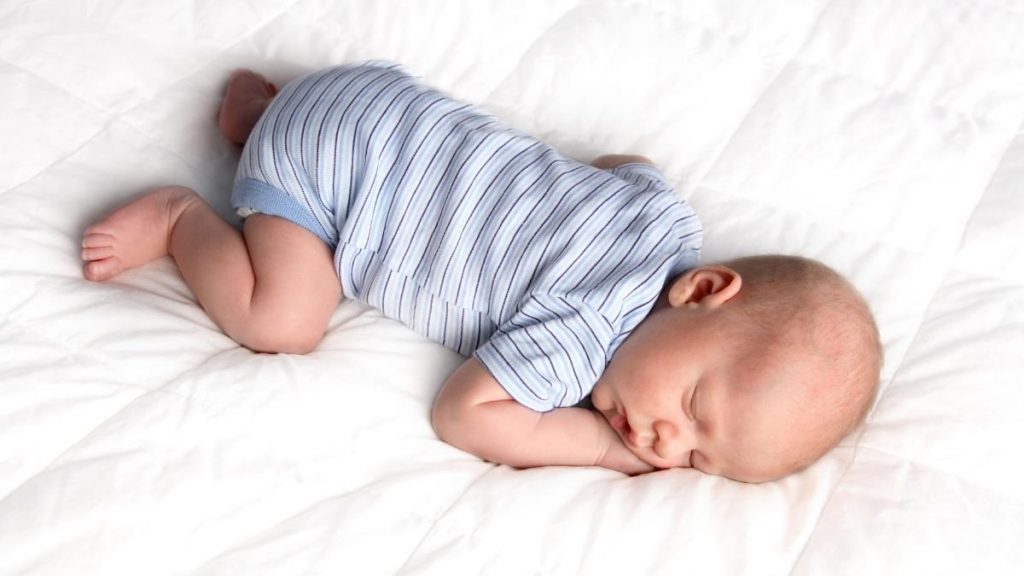Are you worried when your baby sleeps face down?
Some circumstances provide gray zones that can be challenging to manage in the maelstrom of dos and don’ts when it comes to your newborn.
Baby sleep is frequently one of these ambiguous regions.
You are likely to discover that the question of whether or not a baby should sleep on its stomach or back is a contentious one that sparks spirited debate.
In this post we’re going to provide answers to some frequently asked issues, such as why babies sleep face down on the mattress, how to stop a baby from sleeping face down and if there are any risks of a baby sleeping on its stomach.
Why do Babies Sleep Face Down in Mattresses?

To start, we’d like to make it clear that when we refer to a baby as “sleeping face down,” we don’t necessarily mean that they are doing so on their face. We’re referring to the baby sleeping on their stomach as opposed to their back. Due to the risk of asphyxia, a newborn should never sleep directly on their face.
A baby’s need to sleep on their stomach is innate. They frequently feel more comfortable and at ease in this position. When a baby doesn’t sleep, some parents will often try this method out of desperation because it also helps to lessen the startle reflex.
It might be challenging to resist the natural tendency of most babies to sleep on their stomachs. Some parents notice that their older babies are attempting to roll over even when they are lying on their backs.
Is it Safe For Babies to Sleep Face Down? (Suffocation risk, SIDS risk?)
Until they are 12 months old, babies should sleep on their backs, according to the American Academy of Pediatrics. The reason for this is that babies under 12 months haven’t yet built the strength and coordination to put themselves out of danger, such as suffocation caused by having their face planted in the mattress.
With that said, after the age of 12 months there is no need to keep attempting to flip your baby onto their back if you notice them regularly rolling from back to tummy and tummy to back.
You’ll probably be surrounded by a lot of well-intentioned advice and opinions when you bring your new baby home from the hospital.
Perhaps your grandmother will caution you never to wake a sleeping child. You can be advised by your neighbor to use a specific bottle exclusively in order to avoid gas. For colic, your mother might advise you to apply grape jelly to the pacifier. It might be confusing and challenging to decide which recommendations to take!
Infant sleep is one topic where you’ll probably hear a lot of contrasting viewpoints. Your doctor will advise sleeping the infant on their back. However, your mother could insist that you slept better on your stomach as a newborn.
With all of the noise you’ll likely be bombarded with, to be as safe as possible, I recommend that you always follow the guidelines of doctors and authorities such as the American Academy of Pediatrics.
How to Stop Your Baby From Sleeping Face Down

In case a wedge is necessary to stop the infant from rolling over, try it. You may ease your concerns and keep your infant safely on their back by simply sliding one of these helpful devices into the crib below the waist.
Using Anti-Roll Supports
Not a big fan of the wedge concept? Other supports intended to prevent your baby from rolling over might be of interest to you.
Using Tummy Time
Your baby can benefit greatly from tummy time by developing stronger back and neck muscles. Give your infant enough time on their tummy during the day so that they can grow physically strong enough to be able to get out of risky situations.
Lay your child face down on a blanket or baby-safe play mat to get started. You’re ready to go if you place a few secure and developmentally appropriate toys within your child’s reach, like a rattle or baby teether. While lying on their stomach, your baby will perform the action by lifting their head and flexing their backs.
Using Breathe Through Mattresses and Sheets
Some mattresses are constructed in such a way that your baby can still breathe through them, even if they are lying face down. Although we would prefer that all mattresses were made in this manner for the safety of our young children, this isn’t the case. Consequently, investing in a breathable mattress is a wise move. Even so, you must ensure that the sheets you use to cover that mattress are permeable. Your best bet is nearly always cotton.
Get Them Used to It
Don’t be surprised if your baby prefers to sleep on their side or stomach. Many babies genuinely prefer to sleep on their stomachs, and they do so because it is a far more comfortable position. The issue is that because many babies are novice tummy sleepers, they are unable to position themselves in a way that promotes the most ventilation.
Fortunately, babies who prefer to sleep on their stomachs can eventually grow to enjoy resting on their backs. When you rock or nurse your baby to sleep, make sure they are on their backs or facing up to help them adjust. Always place your baby face up in bed; never the other way around. Your infant will eventually get used to sleeping this way and may even like it!
Roll them Over
If all else fails and your baby is little and won’t sleep on their back, you might occasionally have to roll them over.
But keep in mind that once your baby is 6 months old and able to roll over, they are probably fine staying that way as long as there are no obstacles in the way (like loose blankets, crib bumpers, stuffed animals, pillows, and more).
Before you know it, you’ll be passed these problems and dealing with an unruly toddler. Instead, you’ll be thinking about how to keep your kid in bed in the middle of the night!
Back Really is Best
Whether your baby prefers to sleep on their back or stomach, the risks still outweigh the advantages for babies who sleep on their stomachs. Even if it appears that your baby sleeps better at night this way, the risk isn’t worth it, especially for infants under six months. Always seek advice from your neighborhood pediatrician if you have specific questions about your child’s quality of sleep.
Always keep in mind that you should always get professional advice concerning your baby’s health and well-being if you are unsure.
How Long Can a Baby Sleep Face Down?
Even if your baby rolls onto hes or her stomach at night, you should still put him or her to bed on their back until they are 12 months old. Doing this significantly lowers your baby’s chance of SIDS, which is one of the most common causes of infant death, particularly in the first four to six months of life.
Is it OK For a 6 Month Old to Sleep Face Down?
You already know that most medical professionals will advise against letting your baby sleep face down. But at what age can infants sleep on their faces? The answer to this query largely depends on your child.
In particular, your child should be able to sleep on their stomach as soon as they can turn over on their own. Having said that, it doesn’t mean you should put your child on their stomach; rather, you shouldn’t feel compelled to turn them over whenever they find themselves in this position on their own.
By the age of 12 months, you should feel comfortable putting your child on their stomach or back because they will be able to wriggle out of dangerous situations if necessary easily.
Even with the assurance, many parents prefer to turn their children over onto their backs once they notice them rolling onto their stomachs. It isn’t a negative habit, even though it’s not always essential, but if you try it constantly, it could wake your infant and prevent them from falling asleep deeply.
Related Questions
Does Stomach Sleeping Increase SIDS Risk?
Placing a baby to sleep on their back for naps at night is the single most effective step parents and caregivers can take to reduce the risk of SIDS.
By 1.7 to 12.9% more than back sleeping, stomach sleeping raises the risk of SIDS. The exact reasons as to why stomach sleeping might cause SIDS are still unclear.

